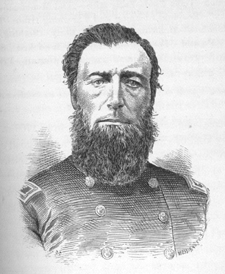
 |
Colonel Joseph Snider at Chancellorsville |
During the Chancellorsville campaign, Snider was noted mentioned in the report of brigade commander Colonel S. S. Carroll as having exercised "cool judgment and indomitable courage." On May 4, however, Snider was forced to retire from the front "in consequence of severe illness." His subordinate, Lieutenant Colonel Jonathan H. Lockwood, was again forced to assume command.
"On the morning of the 1st instant, our regiment, under command of Col. Joseph Snider, was, with the brigade, under command of Colonel Carroll, in a field about half a mile north of Chancellorsville.
About 12 m. we marched with the brigade some distance toward Chancellorsville, when we were about-faced, marched back, and occupied the ground we had just left.
At about 6 p. m. by order of Colonel Carroll, we formed in line of battle in a field fronting the ground occupied by the Eleventh Army Corps, and the men slept in rear of their stacks during the night.
On the 2d instant, at 8 a. m. we were ordered to a position on the left of the road leading from the United States Ford to Chancellorsville, where we constructed breastworks.
On the 3d instant, at about 7 a. m. we were ordered to form in line of battle, which we did in an open field fronting the wood that lay between us and the enemy, our regiment, under command of Col. Joseph Snider, occupying a position to the left of the Fourth Ohio and on the extreme left of the brigade.
About 8 a. m., by order of Colonel Carroll, the entire line of the brigade was ordered forward, and, when we had advanced but a short distance into the wood, we met the enemy advancing toward us in large force, and, when in close proximity to each other, we opened on them with a volley of musketry that apparently shook the ground they walked on. We immediately charged into them, putting them to flight; followed them up, and slaying them as they ran through the wood, some of them falling dead, some wounded, while others of them threw down their arms, and, throwing up their hands, ran into our lines, and many of them fell upon their faces and lay still until our lines passed over them, when they would jump up and say they were where they wanted to be. In this way we ran them through the wood and beyond the Gordonsville Plank road into an open field, where other forces of the enemy were in their breastworks and redoubts, from which they had just removed their artillery, leaving piles of shells in their works. From all these we routed them, capturing and sending to the rear in all about 150 of the enemy, and recapturing or releasing a battalion of Zouaves, who had been surrounded by the enemy before we advanced, and capturing a stand of colors belonging to the enemy, which the Zouaves took possession of, carrying it to our rear, and claiming it as theirs.
The enemy in our front, seeing us occupy their first line of works, opened upon us with canister and grape and a heavy enfilading fire, and forced us to retire to the cover of the wood, where we held our position until ordered by Colonel Carroll to withdraw from the field, reporting to him in the field in rear of the wood, where the remainder of the brigade were ordered to form and replenish their supply of ammunition. From here we took position on the left of the road, which we had left the day previous. During the day we were moved to the left flank by order of Colonel Carroll, and took position at right angles from the one now occupied, our right resting and adjoining the right of the Eleventh Army Corps. Here we constructed breastworks.
On the 4th instant, in consequence of severe illness, Col. Joseph Snider and Major Morris had to retire from the front, leaving the entire command of the regiment with Lieutenant-Colonel Lockwood.
At 11 a.m. and 2 p.m. there was heavy artillery firing to the right of our post, and during the day frequent picket encounters, but we succeeded in repulsing them and preventing a general engagement, which our men were anxious to have come on.
On the 6th instant, at 2 a.m., took up the line of march, crossing the river at the United States Ford on the pontoon bridges, arriving at this, our former camp, about 12 m. the same day.
Our losses, so far as ascertained, are as follows : 5 killed, 19 wounded, and 13 missing.* (But see revised statement, p. 177) Among the killed, I regret to say, was Capt. F. M. Roberts, one of our most efficient and worthy officers, who was greatly beloved by all who knew him.
I cannot speak too highly of the courage and coolness of the officers and men of my regiment. Suffice it to say they maintained their former reputation, won in many hard conflicts, for daring, bravery, and courage." (Series I, Volume 25, Part I)